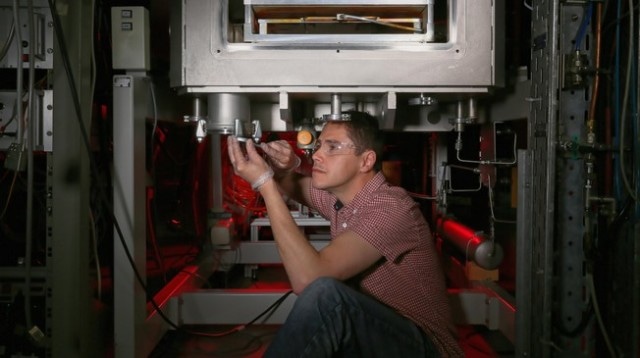May 4 2016
One of the major sources causing pollution on our Earth is cargo shipping. Roughly 55,000 ships are used for cargo transport over the oceans every day. The fuel used to power such ships is dirtier than diesel. According to lax standards, maritime transport, in addition to air transport, has become one of the major sources of emitting sulfur and nitrogen oxide. However, rigorous sulfur emission standards will come into force from 2020 as the International Maritime Organization has initiated stringent emission limits.
 © Alain Herzog 2016
© Alain Herzog 2016
In response to this issue, an EPFL start-up is involved in the development of a nanostructured filter for application in the exhaust stacks of a ship. This may provide an economical solution to achieve the new targets. The start-up, named Daphne Technology, is expected to succeed in this massive market.
The nanostructured filter has the ability to lower nitrogen oxide emissions to 15% and sulfur emissions to less than 1% of the existing standards under laboratory conditions. This is a significant achievement, considering the requirement of the new standards is roughly a 14% reduction in sulfur emissions.
The nanostructured filter can be manufactured using the same method employed for solar cell production. The manufacturing process involves nanostructuring a thin metal plate of titanium so that its surface area is increased. The next step is depositing a number of substances in ultrathin layers and placing the resulting plates vertically in an evenly spaced manner to create channels that allow the toxic gases to pass through. The nanostructured surfaces capture the gases. This method could be an eco-friendly solution as it is possible to recycle the substances in the filter. The exhaust gas itself turns out to be inert and holds potential for use in a myriad of products, including fertilizer.
The next challenge is finding out a method to fabricate these nanostructured filters on large surfaces at a lower cost. Researcher Mario Michan invented a machine at EPFL’s Swiss Plasma Center that can be modified to fulfill his requirements. The machine allows deposition of thin layers of substances using plasma. Fabricating a prototype is the next step of the researcher to test the machine under real-world conditions.
Michan conceived the idea of mitigating toxic gas emissions using the experience he gained from working on merchant ships, during which he was pursuing his Master’s degree in microengineering. It took several years, a few patents and some techniques he picked up in other laboratories he worked in, for Michan to advance in his project. While working at CERN, he got the opportunity to learn about the technologies utilized for coating the interior of particle accelerators. At this time, he determined a process required for his original concept. An EPFL patent combining the different aspects of the technology and various production secrets must be filed in this year.
In accordance with the data provided by the European Environment Agency, sulfur emissions by merchant ships are 204 times higher than billions of cars running on the roads globally. Michan predicts that if his nanostructured filters were employed in all cargo ships, these emissions would be reduced to roughly double the level released by all cars, and the ships would not require using another fuel. According to the market research done by Michan, although other solutions are available in the market, they have their own limitations:
Marine diesel fuel is cleaner but much more expensive and would drive up fuel costs by 50% according to ship owners. And the other technologies that have been proposed cannot be used on boats or they only cut down on sulfur emissions without addressing the problem of nitrogen oxide.
Mario Michan, Researcher, EPFL